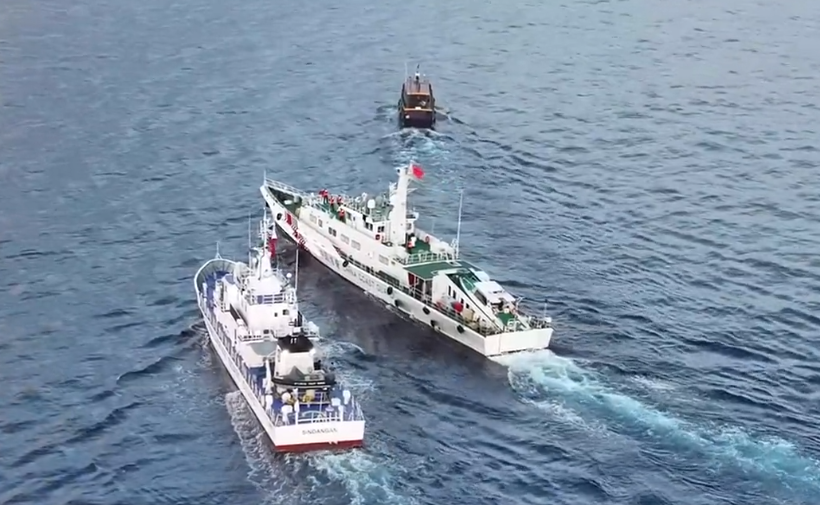The United States on Monday reiterated that an armed attack on Philippine Armed Forces and public vessels, including the Philippine Coast Guard’s ships, could trigger the 72-year-old Mutual Defense Treaty of the Philippines and the United States.
“The United States reaffirms that Article IV of the 1951 U.S.-Philippines Mutual Defense Treaty extends to armed attacks on Philippine armed forces, public vessels, and aircraft — including those of its Coast Guard — anywhere in the South China Sea,” the US State Department said in a statement.
The statement came a day after a China Coast Guard ship collided with a Philippine vessel that was conducting a routine resupply mission to Ayungin Shoal. A Chinese maritime militia vessel allegedly bumped the BRP Cabra, one of the PCG ships that were escorting the contracted boat of the AFP.
For its part, the Philippines’ Department of Foreign Affairs said further study is needed to invoke the MDT due to the incident.
“The matter about filing another case is something that is still being studied by the government. But, of course, all incidents like these will actually bolster the case that it is not the Philippines that’s the aggressor but the other party which is China that’s actually undertaking dangerous maneuvers and blockades,” DFA spokesperson Teresita Daza said.
“It’s a provocation on the side of China, but at this point, whether it will constitute an armed attack that would allow the invoking of MDT is something that needs to be studied,” she added.
Signed in 1951, the Philippines and the US agreed that an armed attack in the Pacific area on either of the parties would be dangerous to its own peace and safety and declared that it would act to meet the common dangers in accordance with its constitutional processes.
China insists on claiming the Ayungin Shoal, also known as Second Thomas Shoal, which is located 105 nautical miles west of Palawan and is part of the Philippines’ exclusive economic zone.
Over the past years, a swarm of CCG ships and Chinese maritime militia vessels have been monitored in the WPS, in defiance of the 2016 Arbitral Award on the South China Sea that the Philippines won against China in the Permanent Court of Arbitration.
International communities
The US said it stands with the Philippines in the face of the People’s Republic of China’s “dangerous and unlawful actions obstructing” the 22 October Philippine resupply mission to Second Thomas Shoal.
“By conducting dangerous maneuvers that caused collisions with Philippine resupply and Coast Guard ships, the PRC Coast Guard and maritime militia violated international law by intentionally interfering with the Philippine vessels’ exercise of high seas freedom of navigation,” the US State Department said.
“PRC conduct jeopardized Filipino crew members’ safety and impeded critically needed supplies from reaching service members stationed at the BRP Sierra Madre. Obstructing supply lines to this longstanding outpost and interfering with lawful Philippine maritime operations undermines regional stability,” it added.
Citing the 2016 arbitral ruling on the South China Sea, the US noted that China’s territorial claims to Ayungin Shoal, a low-tide elevation outside the territorial sea of another high-tide feature, were unfounded.
“The unsafe maneuvers on October 22 and the PRC water cannoning of a Philippines’ vessel on August 5 are the latest examples of provocative PRC measures in the South China Sea to enforce its expansive and unlawful maritime claims, reflecting disregard for other states lawfully operating in the region,” it stressed.
Aside from the US, Japan, France, Canada, Australia and Germany also condemned China’s aggressive actions in the West Philippine Sea.
In a separate statement, Canada condemned what it described as “unlawful and dangerous conduct” of China in the WPS, which “provoked two collisions with Philippine vessels engaged in routine operations inside the Philippine Exclusive Economic Zone, in the vicinity of Ayungin Shoal.”
“The PRC’s actions are unjustified. China has no lawful claim to the West Philippine Sea. Its actions are incompatible with the obligations of a signatory to the UN Convention on the Law of the Sea,” the Canadian Embassy in Manila said.
“Continuing acts of intimidation and coercion undermine safety, stability, and security across the region, and increase the risk of miscalculation,” it added.
France also expressed its “deep concern” regarding the dangerous maneuvers of CCG against Philippine vessels “engaged in the Philippine exclusive economic zone.”
“France calls for respect of the freedom of navigation guaranteed by international law and recalls its attachment to the United Nations Convention on the Law of the Sea and the decision rendered by the Arbitral Court on July 12, 2016,” the Embassy of France to the Philippines said.
Japan, likewise, stressed that it was “seriously concerned” and “alarmed” about the collision of Chinese vessels with Philippine vessels.
“Seriously concerned about and alarmed by the collision between Chinese and Philippines vessels,” Japanese Ambassador to the Philippines Koshikawa Kazuhiko said in a tweet.
Koshikawa said Japan “strongly opposes any unilateral attempts to change the status quo by force or coercion.”
“We stand with/by the Philippines’ position; upholding maritime order based on UNCLOS & 2016 Arbitral Award,” he added.
Germany also expressed concern over the incident in the WPS.
“Germany is very concerned about recent confrontations in the SCS involving Chinese coast guard ships and maritime militia vessels in the exclusive economic zone of the Philippines,” German Ambassador to the Philippines Ambassador Andreas Pfaffernoschke said in a separate tweet.
Pfaffernoschke called on “all parties” to act in accordance with UNCLOS rules and to respect the 2016 arbitral award.
